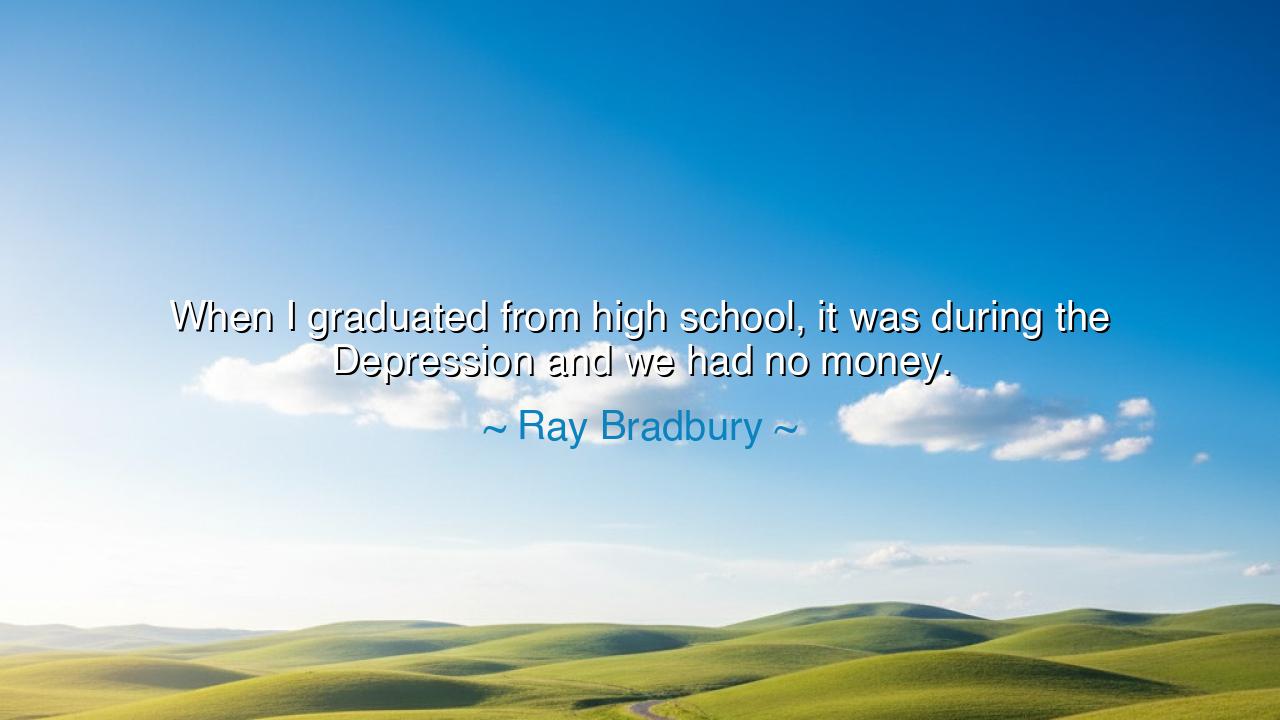
When I graduated from high school, it was during the Depression






The words of Ray Bradbury — “When I graduated from high school, it was during the Depression and we had no money.” — are humble in tone, yet they carry the weight of endurance, faith, and the spirit of creation rising from hardship. Beneath this simple recollection lies the story of a generation forged in scarcity, a generation that learned to dream not despite their poverty, but because of it. For Bradbury, as for so many who lived through that dark and uncertain era, the absence of material wealth became the fire that tempered the soul — the test that would reveal whether a person’s worth was measured by what they possessed, or by what they dared to imagine.
Ray Bradbury, born in 1920, came of age during one of the most difficult chapters in human history — the Great Depression. The world had fallen into economic ruin, and for millions of families, even survival required courage. Yet, while many lost their fortunes, Bradbury found something that could not be purchased: imagination. Deprived of access to college, unable to afford formal education, he made the libraries of Los Angeles his university and the books within them his mentors. From those shelves he absorbed the wisdom of ages — Shakespeare, Dickens, Poe — and from those silent pages, he built the foundation of a literary mind that would one day set worlds aflame with words.
His statement is more than personal memory; it is a declaration of resilience — the kind that arises when all worldly comforts are stripped away. The Depression, though an age of suffering, was also an age of renewal. It taught humanity the virtue of perseverance, of labor without immediate reward, of finding beauty in survival itself. For Bradbury, poverty did not mean limitation, but invitation — an opening into the vast realm of human imagination. He could not buy an education, so he built one within himself. He could not travel the world, so he created entire worlds from his mind. His “no money” was not an ending, but the beginning of a lifetime’s richness of spirit.
The ancients understood this truth well. Epictetus, the Stoic philosopher born into slavery, taught that wealth and status are nothing compared to the freedom of the inner life. He said that “circumstances do not make the man, they reveal him to himself.” So it was with Bradbury. When the world gave him nothing, he turned inward and discovered everything. His graduation during the Depression was not just the close of youth, but the opening of the greatest classroom of all — the classroom of struggle, in which life itself became the teacher.
There is a parallel, too, in the story of Helen Keller, who, though struck blind and deaf from infancy, learned to see and hear through the power of the soul. Like Bradbury, she was denied what others took for granted, yet she transformed her deprivation into a gift. Her words, like his, remind us that limitation is never the end — it is the soil in which genius and compassion grow. Both Keller and Bradbury lived the truth that what we lack in circumstance, we may gain in vision. Their greatness was not born from privilege, but from the alchemy of perseverance — turning hardship into wisdom, poverty into art, and struggle into strength.
Bradbury’s words are also a quiet rebuke to a modern world that confuses comfort with purpose. He reminds us that greatness does not depend upon abundance, nor does creativity require permission. The imagination, once awakened, is the most democratic of gifts — it asks for nothing but attention, discipline, and faith. When he says, “we had no money,” he does not speak in bitterness, but in gratitude — for it was in the absence of wealth that he found his freedom to dream, unburdened by luxury, untamed by convention.
So let this be the teaching, O listener: do not despise humble beginnings, for within them lie the seeds of greatness. If you find yourself in want, remember Bradbury’s example — that the richest minds are often born in times of famine, and the brightest fires are kindled in the coldest nights. Seek not what the world can give, but what your own heart can build. Read deeply. Create passionately. Work tirelessly. For the truest education is not found in golden halls, but in the ceaseless striving of the spirit that refuses to surrender.
For in the end, Ray Bradbury’s words stand as a monument to endurance — a reminder that adversity is not an enemy, but an ally in disguise. The Depression may have taken his wealth, but it gave him his vision; it taught him that the human spirit, when tested, can build entire universes from nothing but hope and ink. And so he teaches us still: that when the world is empty, the mind must become full — and that in the darkest of times, imagination is the light that leads us forward.






AAdministratorAdministrator
Welcome, honored guests. Please leave a comment, we will respond soon